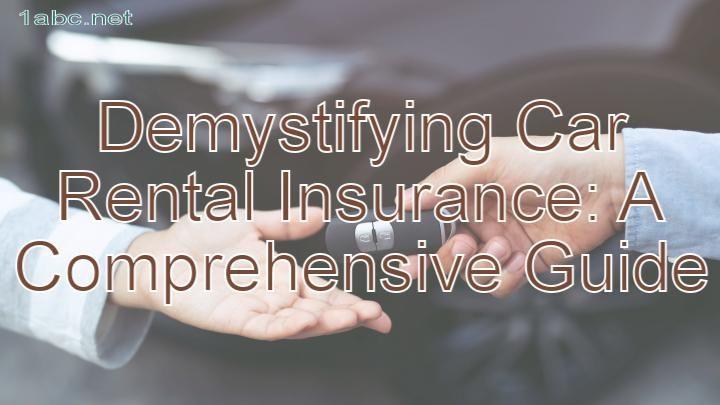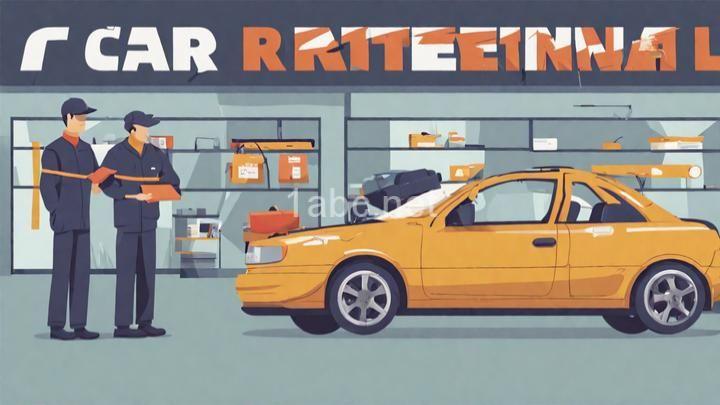Demystifying Car Rental Insurance: A Comprehensive Guide
Introduction:
I. Understanding Car Rental Insurance Basics:
1. Collision Damage Waiver (CDW) or Loss Damage Waiver (LDW):
2. Supplemental Liability Insurance (SLI):
3. Personal Accident Insurance (PAI) / Personal Effects Coverage (PEC):
II. Evaluating Existing Coverage:
III. Deciding Whether to Purchase Additional Coverage:
IV. Tips for Navigating Car Rental Insurance:
Conclusion:

Introduction:
Welcome to our blog, where we aim to provide you with all the information you need to understand and navigate the world of car rental insurance. Renting a car can be an exciting and convenient way to explore a new city or country, but it's important to have a clear understanding of car rental insurance to protect yourself and your finances. In this comprehensive guide, we will cover the basics of car rental insurance, evaluate existing coverage options, help you decide whether to purchase additional coverage, and provide tips for navigating the often confusing world of car rental insurance policies.
I. Understanding Car Rental Insurance Basics:
A. What is car rental insurance?
Car rental insurance is a type of coverage that protects you in case of damage, theft, or any other unforeseen incidents that may occur while you are renting a car. It provides financial protection and peace of mind during your rental period. While car rental insurance is not mandatory, it is highly recommended as it can save you from potential financial burdens in the event of an accident or damage to the rental vehicle.
Car rental insurance offers several key benefits. Firstly, it covers the cost of repairs or replacement of the rental car in case of damage or theft. This can save you from paying exorbitant fees out of pocket. Secondly, it provides liability coverage, protecting you from potential lawsuits or claims from third parties in case of an accident. Finally, car rental insurance often includes additional coverages such as personal accident insurance and personal effects coverage, which can provide further protection for yourself and your belongings.
B. Types of coverage options:
1. Collision Damage Waiver (CDW) or Loss Damage Waiver (LDW):
Collision Damage Waiver (CDW) or Loss Damage Waiver (LDW) is a common type of coverage offered by car rental companies. CDW/LDW relieves you of financial responsibility for any damage or theft of the rental vehicle. In other words, if you have CDW/LDW coverage and the car gets damaged, the rental company will cover the costs, provided you comply with the terms and conditions of the waiver.
It is important to note that CDW/LDW may have certain limitations or exclusions. For example, it may not cover damage caused by reckless driving, driving under the influence, or driving off-road. It's crucial to thoroughly read and understand the terms and conditions of the CDW/LDW before signing the rental agreement.
2. Supplemental Liability Insurance (SLI):
Supplemental Liability Insurance (SLI) is an additional coverage option that protects you against third-party claims in case of an accident. While CDW/LDW primarily covers damage to the rental vehicle, SLI provides coverage for injuries or damages caused to other people or their property. In some cases, SLI may also cover legal fees if you are sued as a result of an accident.
The coverage limits and exceptions for SLI can vary depending on the rental company and the location. It is recommended to carefully review the terms and conditions of SLI before deciding whether to purchase it. If you have a personal auto insurance policy that includes liability coverage, it is advisable to check if it extends to rental cars. If it does, you may not need to purchase SLI.
3. Personal Accident Insurance (PAI) / Personal Effects Coverage (PEC):
Personal Accident Insurance (PAI) and Personal Effects Coverage (PEC) are additional coverages that provide protection for yourself and your belongings.
PAI covers medical expenses, accidental death, and dismemberment benefits for you and your passengers in case of an accident. PEC, on the other hand, covers the loss or damage of personal belongings inside the rental vehicle.
Adding PAI and PEC to your car rental insurance policy can be beneficial in certain situations. For example, if you are traveling to a remote location with limited medical facilities, PAI can provide valuable coverage. Similarly, if you are carrying expensive items with you, such as camera equipment or jewelry, PEC can offer peace of mind.
II. Evaluating Existing Coverage:
A. Check your personal auto insurance policy:
Before purchasing car rental insurance, it's important to review your existing auto insurance policy. Some auto insurance policies provide coverage for rental cars, but there may be limitations or exclusions that you need to be aware of.
For example, your personal auto insurance may only cover the rental car for the same coverage limits as your own vehicle. If you have a basic liability-only policy, it may not provide comprehensive coverage for a rental car. Additionally, some policies may exclude coverage for certain types of vehicles, such as luxury cars or motorcycles. It's crucial to understand the coverage provided by your personal auto insurance and assess whether it is sufficient for your needs.
B. Credit card benefits:
In addition to personal auto insurance, some credit cards offer rental car insurance benefits. These benefits can vary depending on the credit card issuer and the type of card you have.
Credit card rental car insurance typically provides coverage for damage or theft of the rental vehicle, as well as secondary liability coverage. Secondary liability coverage means that it kicks in after your personal auto insurance or the rental company's insurance has been exhausted.
It's important to note that credit card rental car insurance benefits often come with specific conditions. For example, you may be required to pay for the rental car using the credit card in order to be eligible for the coverage. Additionally, certain types of vehicles may be excluded from coverage, such as trucks or exotic cars. It's crucial to read the terms and conditions of your credit card's rental car insurance benefits to understand the coverage and any limitations that may apply.
III. Deciding Whether to Purchase Additional Coverage:
A. Assessing personal needs and risk tolerance:
When deciding whether to purchase additional car rental insurance, it's important to consider your personal needs and risk tolerance. Factors such as destination, driving conditions, and personal preferences can all play a role in this decision.
If you are renting a car in a foreign country where the driving laws and road conditions may be different from what you are accustomed to, you may want to consider purchasing additional coverage for added peace of mind. Similarly, if you are planning to travel to a high-crime area where car theft is common, it may be wise to invest in comprehensive coverage.
Your personal risk tolerance is also a crucial factor. Some individuals prefer to have maximum protection and are willing to pay extra for additional coverage, while others may feel comfortable with the basic coverage provided by their personal auto insurance or credit card benefits.
B. Cost-benefit analysis:
Once you have assessed your personal needs and risk tolerance, it's important to weigh the costs of purchasing additional coverage against the potential benefits.
Car rental insurance can add a significant cost to your rental expenses. However, it can also provide valuable coverage and protection in case of an accident or damage to the rental vehicle. To make an informed decision, consider the potential costs you may have to bear if you decline additional coverage. Factor in the cost of repairs or replacement of the rental vehicle, as well as any potential liability claims from third parties.
Additionally, consider the potential impact on your personal auto insurance premiums if you were to file a claim for a rental car accident. If you have a high deductible on your personal auto insurance, it may make financial sense to purchase additional car rental insurance to avoid paying a large out-of-pocket amount in case of an accident.
IV. Tips for Navigating Car Rental Insurance:
A. Research and comparison shopping:
To ensure you are getting the best coverage at the most competitive price, it's important to research and compare car rental insurance options from different rental companies. Prices and coverage options can vary significantly, so it's worth spending some time comparing quotes.
When comparing, pay attention not only to the cost but also to the coverage limits, deductibles, and any additional fees associated with the insurance. Some rental car companies may offer bundled packages that include multiple coverage options, which can be more cost-effective than purchasing each coverage separately.
B. Understanding terms and conditions:
Car rental insurance policies often come with a variety of terms and conditions that can be confusing and overwhelming. Some common terms and conditions include exclusions for certain types of damage or activities, requirements for reporting accidents, and procedures for filing claims.
It's important to take the time to thoroughly read and understand the terms and conditions of the car rental insurance policy before signing the rental agreement. If you have any uncertainties or questions, don't hesitate to ask the rental company for clarification. It's better to be fully informed upfront rather than facing surprises or challenges later on.
Conclusion:
In conclusion, understanding car rental insurance is essential when renting a vehicle. With the right knowledge, you can protect yourself and your finances from potential risks and liabilities. This comprehensive guide has covered the basics of car rental insurance, evaluated existing coverage options, helped you decide whether to purchase additional coverage, and provided tips for navigating the world of car rental insurance.
Remember, it's important to assess your personal needs and risk tolerance, evaluate your existing coverage, and carefully consider the costs and benefits before making a decision. Research and comparison shopping can help you find the best coverage at the most competitive price. Finally, always take the time to read and understand the terms and conditions of the car rental insurance policy to avoid any potential surprises or challenges.
We hope this guide has demystified car rental insurance for you and provided you with the information you need to make informed decisions when it comes to protecting yourself during your travels. Safe and happy renting!
FREQUENTLY ASKED QUESTIONS
What is car rental insurance?
Car rental insurance refers to the coverage you can purchase when renting a car. It is designed to protect you financially in case of accidents, damages, or theft during the rental period. Car rental companies typically offer different types of insurance, including collision damage waiver (CDW), liability insurance, personal accident insurance, and personal effects coverage. These insurance options can provide peace of mind and help cover the costs associated with any unfortunate incidents that may occur while driving a rental car. It is important to carefully review the terms and conditions of the insurance coverage offered by the rental company to understand what is included and excluded.
Why do I need car rental insurance?
Car rental insurance is important for several reasons:
- Protection against damage: If your rental car is involved in an accident or is damaged, car rental insurance can cover the cost of repairs. Without insurance, you would have to pay for these expenses out of pocket.
- Liability coverage: Car rental insurance can also provide liability coverage in case you cause an accident that results in injury to others or damage to their property. This can protect you from potentially significant financial liabilities.
- Avoiding personal auto policy claims: Using car rental insurance can help prevent a claim from being filed against your personal auto insurance policy. This can save you from potential premium increases or even policy cancellations.
- Additional benefits: Some car rental insurance policies may also offer additional benefits, such as coverage for personal belongings stolen from the rental car or reimbursement for expenses if the rental car is rendered inoperable.
It is important to carefully review the terms and conditions of the car rental insurance policy and consider your specific needs and circumstances before deciding whether to purchase it.
What does car rental insurance cover?
Car rental insurance typically covers the following:
- Collision Damage Waiver (CDW) or Loss Damage Waiver (LDW): This coverage relieves you of financial responsibility if the rental car is damaged or stolen, usually excluding any deductible amount.
- Liability Insurance: It provides protection against any damages or injuries you may cause to other individuals or their property while driving the rental car.
- Personal Accident Insurance (PAI): This coverage provides medical and ambulance expenses for you and your passengers in case of an accident.
- Personal Effects Coverage (PEC): It covers the loss or damage of personal belongings inside the rental car, such as electronics or luggage.
- Supplemental Liability Insurance (SLI): This coverage offers additional liability protection beyond the basic liability insurance limits provided by the rental company.
It's important to note that the coverage, limits, and terms may vary among rental companies and countries. It's recommended to read the rental agreement thoroughly and consider your existing insurance policies before deciding on additional coverage.
How much does car rental insurance cost?
The cost of car rental insurance can vary depending on several factors including the type of coverage, the duration of rental, your location, and the rental car company. On average, car rental insurance can range from $10 to $30 per day. It is recommended to check with your specific rental car company to get accurate pricing information and understand the coverage options available to you.
Can I use my personal auto insurance for rental cars?
Yes, it is possible to use your personal auto insurance to cover rental cars. However, this may depend on your insurance policy and the specific terms and conditions outlined by your insurance provider. Some personal auto insurance policies may provide coverage for rental cars, while others may not. It is recommended to contact your insurance provider directly to confirm whether your policy includes coverage for rental cars and to understand the extent of that coverage. Additionally, many rental car companies also offer their own insurance options, which you may consider purchasing for additional coverage and peace of mind.
Can I decline car rental insurance if I have my own coverage?
Yes, you generally have the option to decline car rental insurance if you already have your own coverage. If your personal auto insurance policy includes rental car coverage, you may not need to purchase additional insurance from the rental car company. It's important to check with your insurance provider to confirm the extent of your coverage and any limitations or exclusions that may apply when renting a car.




